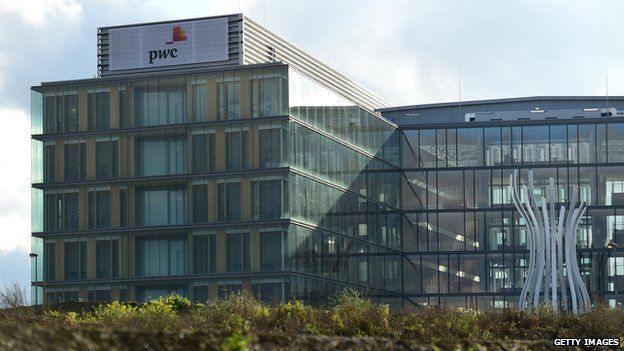PwC promoted tax avoidance 'on industrial scale', say MPs
- Published

Accountancy firm PricewaterhouseCoopers (PwC) has been accused of promoting tax avoidance "on an industrial scale", in a report by MPs.
It is said to have helped hundreds of clients cut their corporation tax bills by setting up bases in Luxembourg.
Earlier this week the Archbishop of Canterbury said companies should pay tax wherever they earned their profits.
PwC said it disagreed with the Public Accounts Committee report but added that the tax system was "too complex".
The report was based on an evidence session held in December, at which PwC gave evidence.
"We believe that PricewaterhouseCoopers's activities represent nothing short of the promotion of tax avoidance on an industrial scale," said Margaret Hodge, chairwoman of the Public Accounts Committee (PAC).
She said PwC had written more than 500 letters to the tax authorities in Luxembourg, on behalf of more than 300 international clients.
The tax avoidance schemes, which are legal, involve companies diverting profits to tax havens like Luxembourg via a series of loans between different parts of the business.
The profits are eventually taxed in that country, but often at tiny rates.
'Positive role'
Shire Pharmaceuticals - based in Basingstoke - was one company said by the MPs to have diverted profits to Luxembourg.
It paid just 0.0156% of its profits to the local tax authority, they said.
The main rate of corporation tax in the UK is 21%.
However Shire said it always complied with tax obligations in the jurisdictions in which it operates.
The MPs also accused PwC of misleading the committee at an earlier hearing.
"We consider that the evidence that PwC provided to us in January 2013 was misleading, in particular its assertions that 'we are not in the business of selling schemes', and 'we do not mass-market tax products, we do not produce tax products, we do not promote tax products'," said Ms Hodge.
In its defence, PwC said: "We stand by the evidence we gave the Public Accounts Committee and disagree with its conclusions about the work we do.
"But we recognise we need to do more to explain the positive role we play in the tax system and in helping businesses to operate successfully.
"We agree the tax system is too complex, as governments compete for investment and tax revenues.
"We take our responsibility to build trust in the tax system seriously and will continue to support reform."
Diverted Profit Tax
The PAC said it was now down to HM Customs and Revenue (HMRC) to challenge the advice given to multinational companies by accountancy firms.
Earlier this week, the Archbishop of Canterbury, Justin Welby, told the BBC there needed to be simplification of an "unbelievably complex tax system internationally."
"If you earn the money in a particular country, the revenue service of that country needs to get a fair share," he said.
The European Commission is currently investigating the internet giant Amazon, over its agreements with the Luxembourg tax authorities.
The UK government is also in the process of introducing the Diverted Profit Tax, announced by the chancellor, George Osborne in the Autumn Statement.
The tax aims to counter the use of "aggressive tax planning techniques" to divert profits from the UK to low tax jurisdictions.
Profits made after 1 April 2015, and diverted to other countries, will be taxed at 25%.
- Published6 February 2015
- Published4 February 2015
- Published7 October 2014
- Published12 April 2014